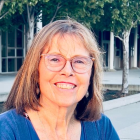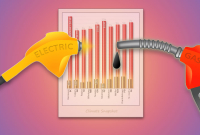Support strong Canadian climate journalism for 2025
Abigail Hunter helps the Biden administration understand the advantages of doing business with the province of Quebec. When this 27-year-old was selected as the Quebec’s government attachée in Washington, D.C., her boss encouraged her to be aware of everything relevant but to focus on where her passion led her.
For Hunter, that was climate change.
This piece is part of a series of profiles highlighting young people across the country who are addressing the climate crisis. These extraordinary humans give me hope. I write these stories to pay it forward.

Tell us about your work.
I start most days with a run while listening to a podcast or the news so I am aware of the issues of the day. Then I might research and brief my superiors on developments on issues of importance to Quebec, like softwood lumber, the dairy industry or changing COVID-19 border protocols. I might help a business owner understand U.S. approaches to furniture manufacturing standards or attend a briefing by U.S. federal officials on any number of subjects.
The scope is wide. But while I am expected to be up-to-date on Washington’s approach to all issues of concern to the Quebec government, my main area of focus is supporting both administrations to work together to meet the climate crisis.
States like New York and Massachusetts know they must transition rapidly to renewable energy to meet their Paris targets and are concentrating on solar and wind. Quebec's hydro offers storage to stabilize the grid. I am also helping advocate for open markets for Quebec’s rich supply of graphite, lithium, phosphate, nickel and aluminum, which are essential components of electric vehicle batteries and frames.
Why is Quebec seen as an attractive partner?
The demand for EV batteries exceeds the supply. The Biden administration and the Quebec government share a commitment to helping meet the demand for components while protecting workers, human rights and the environment. For example, children mine cobalt in some potential supplier countries. By working together for our mutual gain, we can get there faster.
More importantly, we know we can count on each other for secure supply chains in times of crisis. Quebec’s aluminum smelters were an essential contributor to the U.S. war effort in the Second World War. We are a known collaborator.

What makes your work hard?
Convincing people we need each other and can work in mutually beneficial ways is sometimes an uphill battle. Persuading decision-makers to support any change close to home in the interest of the greater good can be challenging.
How did you get this position?
I was born in Canada and my family now lives in Toronto, but I grew up in New Jersey, so living in the U.S. was not a strange idea to me. An internship came up with the National Governors Association, and on the basis of a paper I had written on infrastructure, was offered the job. State governments play a crucial role in mitigating climate change and as a result, even during the Trump years, the U.S. made real progress. It was a powerful lesson that real change can be made even by small groups if we work together.
Through the networks I gained, I was able to win this position and was glad to come back to the Canadian side.

How did you become passionate about climate?
I owe my childhood best friend for gently pushing me toward sustainability since we were 14. She continues to inspire me to find ways to be more of an active player — as a volunteer, an employee and a consumer, with gentle nudges away from fast fashion and meat consumption.
My professors at McGill’s Desautels Faculty of Management helped me find a career path. Undergraduates must study the societal and environmental impacts of the private sector and are supported to make "conscious living" personal with journal reflections and consideration of sustainability career paths, like impact investing, social enterprise and advancing ethical, social and governance standards. The courses I took for my second major “Managing for Sustainability” were my favourite part of my undergrad and I made some of my longest-standing friendships then as we bonded over shared interests.
What gives you hope?
There are so many ways to get where we need to go. It is inspiring to see so many of my classmates and other young people around me engaged and so many of my friends are now trying to change their work so they can join us.
What’s next for you?
My work is very fulfilling, but who knows what is around the corner. To ensure I bring the latest knowledge to whatever I do, I am pursuing a master’s of sustainable energy at Johns Hopkins University.
What would you like to say to other young people?
You deserve a seat at the table. If I make a good case, older people are almost always willing to listen, but if I don’t raise my hand, I won’t get heard.
What would you like to say to older readers?
I see a lot of defeat. You have been worrying about and working on this for a long time, so it's understandable. But we have to believe that we can do this. It is the only moral option, and if we are to succeed, we need you.






Comments